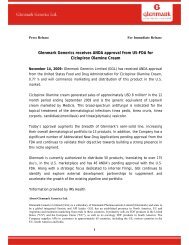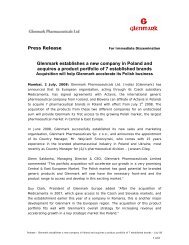Glenmark
Glenmark
Glenmark
Create successful ePaper yourself
Turn your PDF publications into a flip-book with our unique Google optimized e-Paper software.
elated inventory, all of which could have a material adverse effect on our financial conditions and results<br />
of operations.<br />
The regulatory framework in India is evolving and regulatory changes could have a material adverse<br />
effect on our business, results of operations and financial condition.<br />
Until January 1, 2005, India did not grant or recognize pharmaceutical product patents and we were able to<br />
develop and sell some of our products in India and developing markets, although such products were<br />
protected by patents in certain jurisdictions. The patent laws in India have since been amended and the<br />
manufacturers are allowed to apply for patent protection for pharmaceutical products. These changes have<br />
adversely affected the products we produce as well as significantly increased the competition we face. For<br />
example, we were earlier unable to manufacture products, for which the patents had been filed on or after<br />
January 1, 1995 and for which patents had been granted after December 31, 1994, without a license from<br />
the patent holder. Typically, patents have a 20-year term and can be extended in certain circumstances. We<br />
could lose market share and our financial condition and results of operations could be adversely affected<br />
unless we could either develop our own patented products which did not infringe the patents of products<br />
patented after 1995 or were able to obtain a license of such products from the patent holders. The position<br />
has now changed and we are required only to pay reasonable royalty to the holder of a patent obtained after<br />
January 1, 2005 and do not have to obtain a license from them. This is subject to our making a significant<br />
investment in the product and our producing and marketing the product prior to January 1, 2005, up till the<br />
date of the patent holder’s obtaining the patent. There is a possibility of the law changing again, or<br />
reverting to the earlier position, which would adversely affect us.<br />
The Government of India has formulated a draft National Pharmaceutical Policy, 2006, in which it has<br />
recommended, amongst other things that patented drugs, such as formulations under product patents which<br />
are launched in India after January 1, 2005, would be subject to price negotiations before granting them<br />
marketing approval. The draft National Pharmaceutical Policy, 2006, has been circulated to various<br />
interested parties to elicit their views on drug price control mechanisms. It is expected that the National<br />
Pharmaceutical Policy, 2006 will be finalized after the consideration of the various comments and<br />
suggestions received by the Government of India. Currently, it is not certain how the regulatory changes<br />
envisaged by the draft National Pharmaceutical Policy will affect our operations, but any new regulation<br />
may have a material adverse effect on our business. Additionally, if prices are fixed below those currently<br />
prevailing, our operating revenues would be adversely affected.<br />
The timing and content of any new regulation is uncertain and could be more extensive or restrictive than is<br />
currently envisaged in the draft National Pharmaceutical Policy, 2006. As a result, our past financial<br />
performance may not be indicative of our future results. In addition, on-going regulatory changes make it<br />
more difficult to predict what the regulatory environment and market will be in the future and make it<br />
difficult to plan for the medium and long term.<br />
If we are unable to patent new products and protect our proprietary information, or if we inadvertently<br />
infringe on the patents of others, our business may be adversely affected.<br />
While our business has traditionally focused on non-patented products, in the past few years, patents have<br />
become more significant to us. Part of our business and market strategy is based on developing and<br />
introducing generic versions after third party products go off-patent, using non-infringing processes. We<br />
also file and seek to obtain patents for new drugs and novel drug delivery systems under development. Our<br />
success will depend, in part, on our ability in the future to obtain patents, protect trade secrets and other<br />
proprietary information and operate without infringing on the proprietary rights of others. Our competitors<br />
may have filed patent applications, or hold issued patents, relating to products or processes that compete<br />
with those we are developing, or their patents may impair our ability to do business in a particular<br />
geographic area. We have filed a total of 177 patents in India, the United States and under the Patent<br />
Cooperation Treaty and have been granted ten patents. We cannot assure you that our pending applications<br />
will be approved, or the patents we have been granted will result in development of products that will<br />
eventually clear clinical research phases and achieve commercialisation. Any delays as a result of approvals<br />
of pending applications or delays in development may also affect our business operations and financial<br />
9



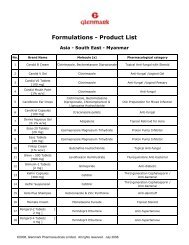
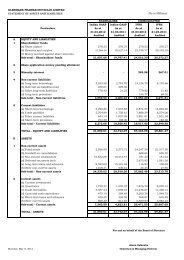
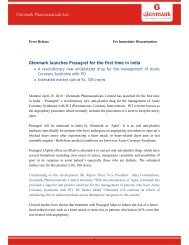
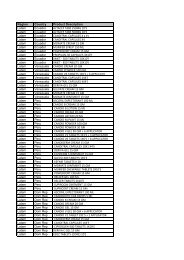
![Formulations [India] â Product List - Glenmark](https://img.yumpu.com/46601329/1/190x245/formulations-india-a-product-list-glenmark.jpg?quality=85)
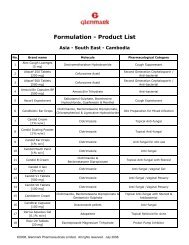
![Formulation [India] â Product List - Glenmark](https://img.yumpu.com/44013338/1/190x245/formulation-india-a-product-list-glenmark.jpg?quality=85)
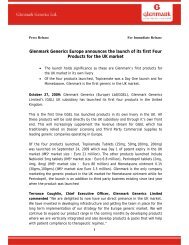

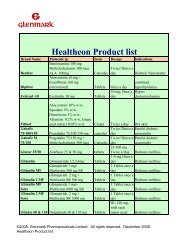
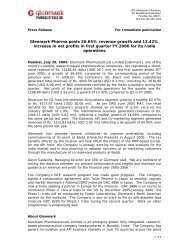
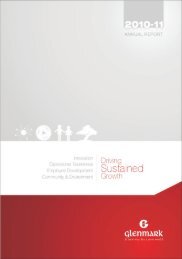
![Formulations [India] â Product List - Glenmark](https://img.yumpu.com/35994839/1/190x245/formulations-india-a-product-list-glenmark.jpg?quality=85)
